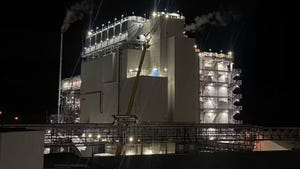Auto glazing: New York taxis employ polycarbonate partition glazing
Teijin Limited (Tokyo) has revealed that Nissan Motor is using plastic glazing made with its Panlite polycarbonate (PC) resin for the driver-passenger partition in its new NV200 taxicabs based on the NV200 compact cargo vehicle. Nissan has begun marketing the vehicle to taxi operators in New York City.
February 24, 2014
Teijin Limited (Tokyo) has revealed that Nissan Motor is using plastic glazing made with its Panlite polycarbonate (PC) resin for the driver-passenger partition in its new NV200 taxicabs based on the NV200 compact cargo vehicle. Nissan has begun marketing the vehicle to taxi operators in New York City.
Nissan's new New York taxi will employ polycarbonate for the driver-passenger partition. |
The plastic glazing, jointly developed with Nissan Shatai Co. Ltd., a Nissan group company that handles vehicle development, is achieved by molding Panlite PC resin using the world's first three-dimensional thick-wall injection-press technology developed by Teijin. The glazing is then hard-coated with Teijin's three-dimensional double-sided flow-coating technology, also a world's first. The result is a smooth, distortion-free surface, which has not been achievable with conventional thick-wall PC molding.
In New York City, a vast majority of taxis are equipped with driver-passenger partitions for enhanced in-vehicle security. The partitions are generally made from acrylic resin, which is flammable and has low resistance to impact. PC resin has been used as a substitute, but it does not achieve a smooth surface in the thick-wall molding, resulting in impaired visibility through the partition.
To meet the growing demand for PC glazing in products such as Nissan's NY200 taxicab, Teijin will begin commercial production of PC glazing parts in Japan. Molding will be handled at the Mihara Plant in Hiroshima Prefecture and hard-coating at the Matsuyama Plant in Ehime Prefecture. Teijin aims to achieve PC glazing sales of JPY10 billion (nearly $100 million) per annum by fiscal 2019.
Teijin has developed various PC resin solutions for panoramic roofs, quarter windows and luggage door garnish trim. Recently, demand for larger plastic parts, such as rear doors and fenders, has been expanding.
Plastic has also made inroads into external glazing for vehicles. Volkswagen, for example, uses Lexan GLX143 PC from Sabic Innovative Plastics (Pittsfield, MA) in the fixed and roll down side windows of its XL1 vehicle. Use of PC is said to Use of PC window glazing with advanced coating technologies reduces weight by 33 percent (2.6 kg) versus 3.2-mm glass solutions, while delivering a high quality optical appearance and scratch-resistant surface. "PC glazing solutions in the XL1's side windows demonstrate the feasibility of plasma coating technology for serial vehicles," adds Sabic.
You May Also Like


